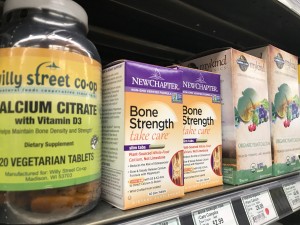 Minerals, similar to vitamins and the right percentages of macros, are necessary for proper functioning of our bodies. I’ve talked a lot about vitamins and supplements but haven’t really spent much time talking about minerals. In this blog, I will only talk about major minerals versus trace minerals because majors are more important for proper body function.
Minerals, similar to vitamins and the right percentages of macros, are necessary for proper functioning of our bodies. I’ve talked a lot about vitamins and supplements but haven’t really spent much time talking about minerals. In this blog, I will only talk about major minerals versus trace minerals because majors are more important for proper body function.
There are is major minerals that are present in our bodies. These six major minerals are important for many body processes including fluid balance, maintenance of bones and teeth, muscle contractions, and nervous system function.
IT’s best to get your minerals from the foods that you eat, but that means eating a healthy balanced diet. However, it’s hard to eat a balanced diet, or some medical conditions, as well ask some medications can lead to either a deficiency or excess of minerals.
The six major minerals are:
Calcium
Chloride
Magnesium
Phosphorus
Potassium
Sodium
Calcium
Calcium is necessary for strong bones and teeth. However, calcium has other functions such as blood clotting and normal nervous system and muscle function. In a healthy diet, it’s easy to get enough calcium. However, there are some diseases that don’t allow the body to absorb enough calcium. Also, those with lactose intolerance, it makes it hard to get enough calcium.
Calcium is found in a dairy product such as milk, cheese, and yogurt. But if you can’t drink milk or eat the dairy product, there are plenty of other foods which contain calcium. Specifically, you can get calcium from nuts, green leafy veggies, and fortified foods.
You can take calcium supplements, however, it’s important to be knowledgeable about which products to take and how much. If not, you can just be wasting money, or you can cause problems with elevated calcium levels such as kidney stones or even brittle bones. Some calcium supplements are not recommended for people with some medical conditions, and they may also interact with some medications.
Chloride
Chloride is important because it creates gastric juices, and is found alongside sodium. It helps to keep your body fluids in balance.
Chloride is found in table salt and many veggies, such as celery and tomatoes. There is generally no reason to take chloride as a supplement.
Magnesium
Magnesium is important because it controls many actions in your body from a biochemical perspective, including proper muscle contractions and nerve impulses. Magnesium also is necessary for blood sugar control, regulation of blood pressure, and it helps to maintain healthy bones.
Magnesium deficiency is quite rare, but it can be lower than desired in those with various diseases, or if alcohol intake is too high. In addition, some medications can suppress magnesium in the body.
Magnesium is found in nuts, seeds, whole grains, legumes and dark green vegetables. It’s also found in yogurt, salmon, fortified breakfast cereal, bananas, and potatoes.
Phosphorus
Phosphorus is for bone growth and normal cell membrane function. It works along with B-complex vitamins to convert the foods you eat into energy that your body needs for all your daily activities. It is stored in bones.
A deficiency of phosphorus is relatively uncommon and is usually associated with medications such as calcium carbonate supplements and antacids. A deficiency severe enough to cause symptoms is rare, and typically only happens with extreme malnutrition.
Phosphorus is found in foods that are high in protein such as meats, nuts, seeds, and legumes.
Potassium
Potassium is needed for a healthy functioning nervous systems and muscle contractions. Potassium is also extremely important in maintaining a normal heart rhythm, and either a deficiency or excess of this mineral can result in life-threatening arrhythmias or respiratory failure. Potassium is found in the fluid inside your cells so it’s essential for normal fluid balance throughout your body. Potassium can also counteract the impact of sodium on blood pressure.
Potassium-rich foods include fruits and vegetables (such as bananas and potatoes), as well as legumes, milk, nuts, and meats.
Sodium
As noted above, Sodium work with chloride to maintain fluid balance outside cells. Sodium intake is important for regulating blood pressure. Sodium deficiency is rare, and in fact, getting too much sodium is a much more widespread problem. Consuming too much sodium may elevate blood pressure in some people.
Sodium, as with chloride, is found in table salt and it’s naturally occurring in many foods. But, sodium comes from processed foods and is a preservative. Take care that you don’t overdo this mineral.
